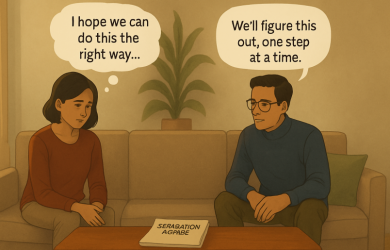Legal Separation vs Divorce: Let’s Know the Difference

Unlock Daily 30-Sec Tips for a Happier Relationship
👉 Subscribe FREEKey Takeaways
Marriage.com AI Quick Summary
An unhappy marriage often makes people want to part their ways with their spouse. Some couples opt for legal separation while some consider a divorce to go their own ways. Some even wonder is separation and divorce the same. It’s necessary to understand the differences of legal separation vs divorce.
An unhappy marriage is one where a person may feel like all love is lost and neither of the partners feels loved or secure. As an escape from such a bad relationship, many of us turn to divorce or legal separation.
Although both of these may seem to have the same purpose, that is to allow married couples to separate paths from each other, there are several differences between legal separation and divorce.
What is the difference between separation and divorce? Or how to understand the ‘separated vs divorced’ debate?
If you are someone who wishes to put a break on your marriage but is confused as to which process to go for, listed down below are the major differences between divorce and separation to help you reach a well-informed decision.
What are legal Separation and divorce?
Legal separation and divorce are both formal ways to end a marriage, differing in their legal status and practical implications. Legal separation is a court order that allows couples to live apart but remain legally married throughout the time.
During a legal separation, spouses can negotiate terms for property division, child custody, and spousal support. Divorce, on the other hand, dissolves the marriage entirely, legally ending the marital relationship.
The process of divorce involves dividing assets and debts, determining custody and visitation, and deciding on alimony. While divorce is permanent, legal separation can be a temporary or permanent arrangement depending on the circumstances of the couple.
5 major differences between legal separation and divorce
Ss separation the same as divorce? Not at all. By definition, legal separation is a court-issued order that allows spouses to live separately while still being married, i.e. without the legal finality that is said to be provided by divorce.
Separation may also be called an alternative to divorce that continues to recognize one’s marriage as legal and valid.
Talking about legal separation vs divorce, we can list out some major differences as given below.
1. Marital status
The biggest difference between separation and divorce is if you opt for separation rather than for divorce, your marital status stays as married. This is because unlike in divorce, your marriage is not yet terminated.
You and your partner may live separately and may have child custody and child visitation orders issued by the court. However, the two of you are still husband and wife. This also means that you are not free to remarry if you are separated and can only do so once you are divorced.
Related Reading: Facebook Marriage Status Why Hide It?
2. Making decisions for one another
Spouses are next of kin, i.e. one’s closest living relative.
The difference between separation and divorce is when a couple is separated, partners still remain the next of kin to each other and carry the right to make medical or financial decisions for one another.
This means your spouse still carries the power of decision-making that they feel is better for you and thus, the entire family. This is only changed when a marriage is legally dissolved through divorce.
3. Benefits such as healthcare
Legal separation provides the retention of healthcare and other social security benefits such as retirement, unemployment insurance, pension insurance, etc.
Social security is necessary particularly in old age to avoid poverty and protect people belonging to the middle class from the ups and downs of the market.
All such benefits remain intact when the couple opts for a legal separation but tend to terminate when the spouses choose to divorce. This difference between separation and divorce is what prevents couples from choosing separation.
4. Property rights
The difference between separation and divorce is that legal separation provides both parties to retain the right to marital property but divorce doesn’t.
This means if you and your partner go for separation, each of you will have your rights preserved to property rights upon the death of the other.
However, a divorce extinguishes any such rights and the property is divided upon the couple’s current situation and their relation to the property.
5. A chance of reconciliation
As the couples remain married due to a separation, there is room for them to reach reconciliation.
The biggest differentiator between legal separation vs divorce is that separation may be temporary but divorce isn’t.
Living apart may allow the two of them to reflect and think about their decision as well as the possible effects of it on their family and future.
Reconciliation is way easier when you are separated and there is also a high chance for couples to eventually put their differences aside and start fresh until and unless they simply can no longer stand each other.
Divorce, however, does not allow any room for reunification and the couples need to remarry if they wish to receive all of their marriage benefits again.
Know the difference while considering legal separation vs divorce
It is clear that divorce is a much more permanent decision as compared to separation. However, each decision has its own advantages and disadvantages. Although there are a few differences between divorce and legal separation, they also have similarities.
If you are going through a phase where considering separation is imperative, it’s important that you know about the options available out of legal separation vs divorce and their consequences.
Since both legal separations and divorce have their set of implications, it is important to consider all aspects of the legal separation vs divorce process when contemplating between the two.
3 pros and 3 cons of separation before divorce
Deciding whether to separate temporarily or head for a divorce is significant and can be a challenging decision for any couple. Sometimes, a trial separation can be a useful tool for couples to evaluate whether they should end their marriage or take a break.
Here are some pros and cons of going for separation before divorce.
Pros:
-
Space to reflect and think
A separation allows both partners to have certain time and space away from each other to reflect on their relationship and understand whether they would want to stay together or not. It can be a period of self-discovery and individual growth, giving each person a chance to reassess their priorities and goals.
-
Chance to work on problems
A separation can be a chance for couples to address their problems and work on their issues with the help of a licensed therapist or counselor. Couples may try to identify the root causes of their conflicts and develop healthy communication skills to resolve their issues.
Related Reading: 30 Common Relationship Problems and Solutions
-
Financial benefits
There can be financial advantages of separation before divorce for couples. For instance, they can stay on the same health insurance plan and file their taxes jointly, which can reduce their tax burden. Additionally, they can avoid the cost of a divorce attorney if they can negotiate the terms of separation.
Cons:
-
Emotional strain:
While separation may offer couples some space, it can also be emotionally challenging. It can be a time of uncertainty, leading to anxiety and emotional distress. Furthermore, this can cause the same level of emotional distress as a divorce, not just to the partners but to their children, as well.
-
May exacerbate problems
Separation may not always lead to reconciliation. It can exacerbate problems, particularly if the separation is marked by hostility or anger. A separation may even solidify the decision to divorce. The period of separation may also provide opportunities to start new relationships.
-
Legal complications
A mutual separation agreement can be just as complicated as a divorce, with the added problem that the couple remains legally married. The legal separation agreement determines child custody, alimony, and child support. However, the agreement may require significant negotiation and compromise from both parties.
Watch Attorney Genelle Johnson provide a guide to legal separation in this video:
Some details about separation before divorce you must know
Before going through with a divorce, it’s important to understand the process of separation. Separation is the legal process of living apart from your spouse while still being married. During this time, both parties can negotiate and settle issues related to property, finances, child custody, and support.
While separation does not dissolve the marriage, and both parties are still considered legally married, divorce puts a permanent end to it. Separation can also impact the divorce process, including the length of time it takes to finalize the divorce and the division of assets.
It’s important to seek the advice of a qualified attorney to understand the specific laws and regulations in your jurisdiction about legal separation vs divorce.
Some relevant questions!
Couples contemplating ways of living apart can have a number of questions about legal separation vs divorce. While we have tried covering the legal aspects of separation and divorce, it’s time to talk about the emotional and practical aspects of them.
-
Is it better to get divorced or separated?
So, is separation better than divorce? Deciding whether to get divorced or separated depends on individual circumstances. Separation may be a good option if the parties are willing to resolve issues and need some time apart to reflect on their relationship dynamics.
Divorce may be necessary if the marriage is irreparable or is causing traumatic effects on either or both parties. Ultimately, it’s important to consider the legal and financial implications of each option, as well as the emotional impact on both parties and any children involved.
Seeking the advice of a qualified attorney can help make an informed decision while thinking of legal separation vs divorce.
-
What should you not do when separating?
When separating, it’s important not to do anything that could harm your legal, financial, or emotional standing. This includes hiding assets, badmouthing your partner to your children, or making any major decisions without consulting with your attorney.
It’s important to seek guidance and advice from a qualified attorney to navigate the separation process effectively. There are various marriage therapy options available these days to consider as well.
Make an informed decision!
Legal separation vs divorce is an elaborate topic to consider, It is essential for couples to evaluate their situation and determine what works best for them. Communication can be key in such situations, and couples must remain committed to honesty and transparency.
Separation can provide an opportunity to address problems and work on the relationship, but it can also lead to more significant emotional distress and exacerbate the problems. Therefore, it is essential to assess the reasons for separation and decide which option is in the best interest of both parties.
 Tips
Tips
Write your tip or submit a video tip
All tips are reviewed before the publishing.
Share this article on
Want to have a happier, healthier marriage?
If you feel disconnected or frustrated about the state of your marriage but want to avoid separation and/or divorce, the marriage.com course meant for married couples is an excellent resource to help you overcome the most challenging aspects of being married.
Recent Articles
Related Quizzes
Unlock Daily 30-Sec Tips for a Happier, Healthier Relationship
👉 Subscribe FREE on YouTube We'd love your feedback!
We'd love your feedback!
 Expert Q&A
Expert Q&A
Ask your question related to this topic & get the support you deserve from experts.

 Reviewed By
Reviewed By


















 Thanks for your feedback!
Thanks for your feedback!